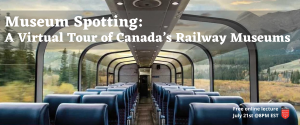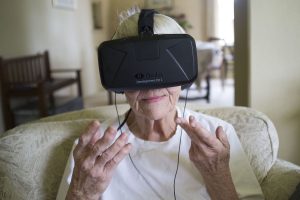Tech-enabled virtual visits to popular art galleries and museums can improve the quality of life for senior citizens and those whose activities may be limited due to age or illness.

Virtual reality technologies enable visits to galleries and museums across Canada and around the world as a way to boost engagement, learning and well-being. Toronto Railway Museum screengrab.
Virtual reality technologies help older adults with age-related impairments to not only visit galleries and museums across Canada and around the world, but to participate in art-related experiences and artmaking activities that can reduce feelings of boredom, depression, and isolation while improving overall well-being.
Those are among the conclusions and observations made in a recent study into virtual museum visits and their outcomes, a study based on months of research conducted with the Montreal Museum of Fine Arts (MMFA). It’s one of several leading arts and culture institutions using virtual reality and other digital media technologies to connect with their audiences, no matter their age.
Arts activities are known to open pathways to emotional and mental well-being because participants keep active by connecting with others, gaining new artmaking skills and abilities, exploring new and creative ways to express themselves, and learning how to see and observe in new ways.
The research published in the Frontiers in Medicine medical journal emphasizes that those older folks who took part in virtual visits saw their well-being and quality of life improve as their measures of social isolation and frailty decreased significantly.
“This participatory art-based activity could become a model that could be offered in museums and arts institutions worldwide to promote active and healthy aging,” said Dr. Olivier Beauchet, lead author of the study. He’s professor of medicine at the University of Montreal, and together with his colleagues, Beauchet recruited and interviewed more than 100 seniors from the Montreal area. Half joined in the 45-minute virtual museum tours, which also included a 15-minute question-and-answer session with a museum guide; the other half did not.
His study builds on previous research that looked at the health benefits of an ongoing MMFA program for seniors called Thursdays at the Museum; it also showed that art-based activities can improve the quality of life and health in older adults.
In addition, the Research Centre of the Geriatric University Institute of Montreal, in collaboration with MMFA and the University of Montreal, is developing new programs in its Arts & Longevity Lab specifically to promote art-based interventions for older adults.

Citation: Appel L, Appel E, Bogler O, Wiseman M, Cohen L, Ein N, Abrams HB and Campos JL (2020) Older Adults With Cognitive and/or Physical Impairments Can Benefit From Immersive Virtual Reality Experiences: A Feasibility Study. Front. Med. 6:329. doi: 10.3389/fmed.2019.00329
And in another study looking at immersive VR therapy for older adults, improved overall well-being was observed. Delivered using a head-mounted display, VR was used to deliver engaging, informative and enjoyable experiences also said to let older adults escape age-related impairments and confined realities.
Those tests made use of a Samsung 360-degree camera to create short custom VR films with amazing clarity and impact.
Complete and seamless visual scenes were recorded in 3,840- x 1,920-pixel (nearly 4K) resolution, clearly showing another way technology can be used to deliver a creative way to improve health and well-being.
Likewise, at the Art Gallery of Ontario, the Virtual Seniors Social Program uses online videos, streaming media tutorials and other art-centred activities to connect with seniors and build a shared capacity for creativity, learning, and wellness.
Introduced late in 2019, the Seniors Social program evolved from the AGO’s Seniors Art Engagement pilot project, a three-year initiative which yielded important research about engaging the senior community. It was sponsored and supported by Amica Senior Lifestyles and a grant from the Government of Ontario.
Amica, a leading provider of private senior residences in Canada, initially partnered with the AGO to offer its residents in-person tours and artmaking experiences, and then helped fund a series of free monthly events open to all seniors. During COVID-19, the AGO pivoted to recreate the program online, using technology to let seniors across the country connect with the Gallery virtually.
In fact, Amica has a webpage filled with descriptions and links of virtual museum tours and online gallery experiences seniors – and everyone else – can enjoy. It’s comprehensive, but somewhat dated as the field is constantly evolving.
For example, citing “[t]he ultimate online destination Virtual Museum of Canada as the country’s largest source of stories, videos and digital experiences” it fails to note that in 2020, the new Digital Museums Canada (DMC) emerged from the Virtual Museum of Canada (VMC), and made the decision to decommission the Virtual Museum of Canada website, including the Virtual Exhibits and the Teachers’ Centre portals.
Fortunately, many of the existing projects are still available, and new virtual projects are being funded: one of most recent is a fascinating virtual lesson in historic ways the arts have been used to build community.
Social isolation is linked to several health threats for seniors, including an increased risk of heart disease and stroke, as well as mental deterioration and even early death. The pandemic only added to seniors’ isolation, while on-going social and economic challenges only make greater the need for technology to be used in creative ways to improve health and well-being.
# # #

Technology can be used in creative ways to improve health and well-being. Image ‘Granny goes virtual’ by Colin and Sarah Northway from Wherever, We find ourselves. This file is licensed under the Creative Commons Attribution 2.0 Generic license.
-30-



